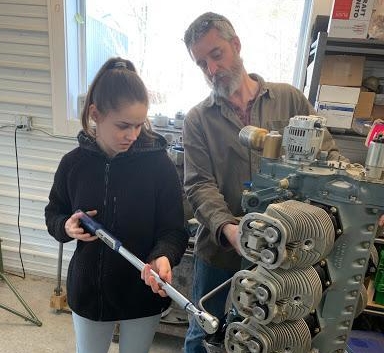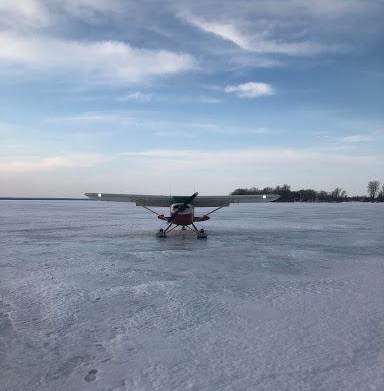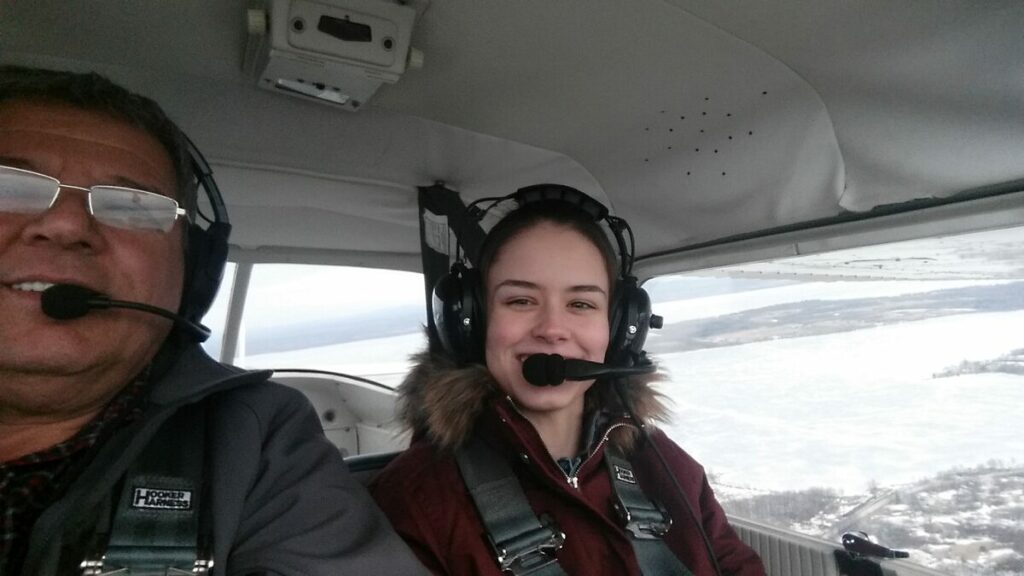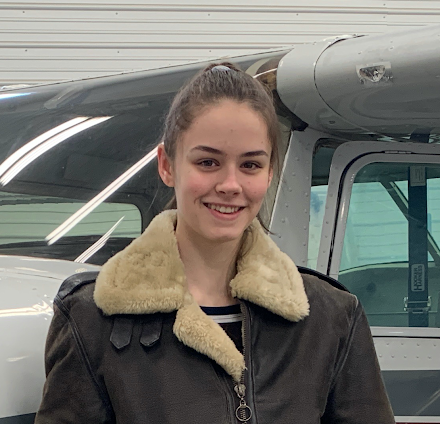The secret to us being able to adapt our expectations and approaches for learning in this time was the collective commitment to deeply personalize my learning in my newfound aviation community—despite forced social isolation.
Julie Torres, Young Learner
This story was originally published on Big Picture Learning’s daily blog where they are featuring stories from the BPL community on how they are managing the transition to distance learning during the COVID-19 pandemic.
We all have those weeks in our lives that will be remembered years later. March 16th was definitely one of those weeks. As the news of COVID-19 and school closures made their way east, there was talk that Vermont schools were likely going to follow suit. What we didn’t expect, however, was how quickly that news would come. Late on Sunday, March 15th, our governor declared all Vermont schools had two days to make the necessary arrangements to close indefinitely. Suddenly, school administrators, parents, and learners alike were facing academic, social-emotional, and logistical challenges.
I had a particularly unique experience when this news came out. I am a high school senior at Missisquoi Valley Union High School with a strong interest in aviation. Once Missisquoi’s Work-Based Learning Coordinator, Richard Barwin, knew about my interest, he connected me with Beth White, Big Picture Learning School Design Coach.
Beth is a local aviator who was recently invited to be the regional coordinator for the Harbor Freight Fellowship program—an opportunity for youth (and mentors) to experience learning through Big Picture Learning’s distinguishers. She encouraged me to apply to work with a local aviation Airframe and Powerplant Mechanic.
Before becoming a Harbor Freight Fellow, my typical day in school consisted of routine, conventional learning. For most of my classes, I sat in a room for about an hour and a half and focused on a singular subject. When I started working with George and Beth through the Harbor Freight Fellows program, however, my schedule began to look different.

Julie Torres learning about aircraft mechanics with her mentor.
As a Harbor Freight Fellow, every other day, I got to leave school to explore my passion. With the mentorship of George and many other amazing people who I met through the early days of my apprenticeship, I realized I could learn everything I needed to know to achieve my goals outside of school. Hands-on, one-on-one learning is a fantastic fit for me, and I became a regular at Franklin County’s Sunday Mechanic’s Club.
At the end of my first day of Mechanic’s Club, Adam Eisel flew me in his Maule airplane around Franklin County. From above, I recognized my high school and the field that I played powderpuff football on earlier in the year. I never knew there was an airport near that field, and I had always been so confused when we saw helicopters circling in the evening and planes coming and going as we played. We also flew over Lake Champlain and the bridge that I drive across almost daily.
Adam let me have control for a while, and I was able to get a feel for the plane. I absolutely loved it. He said I was a natural. Towards the end of the flight, I saw places like my old elementary school and the nearby golf course. When we were done, he flew me home! We decided to land on the lake in front of my house, and I watched him take off again from the shore—not a bad commute home!

The Maule aircraft on the frozen pond behind Julie Torres’s home.
Fast forward a few weeks, the day a national emergency was declared, and I listened to Governor Phil Scott’s initial speech declaring that schools would remain open. I was excited to hear that I would be able to continue with my fellowship. Then, two nights later, I learned while reading a transcript on Facebook, that he ordered all schools to shut down.
My mother and I discussed how we were going to handle the situation, and how I needed to take control of my education without being in a school setting. My last day of school was slow. None of my teachers had any work prepared for us in class because they were busy prepping for the time we would be gone.
For most of my classes, I received online work and some busy work in the form of worksheets and pages to color. We were told that teachers could not give us new learning material, so for the next three weeks we would be studying the same content that was presented pre-COVID-19 cancelations.
Though we have a theoretical date to return to school, nobody really knows if it is certain. A lot of schools in other states declared they would be closed for the rest of the year, and there is a strong chance I will likely not get to experience the conventional school-based things I’ve been looking forward to for many years like prom and walking at graduation.
One bright spot, at least for a day, was that it seemed as if I could continue my apprenticeship full-time at Franklin County Airport while school was closed. However, this was not long lived. On Monday morning, I got the notice from George that he was closing the hangar. I was actually really bummed, this did not feel real. Realizing I would be stuck at home, Beth and I worked together to create a game plan.
They check in on me and ask how I am doing emotionally (not just about my learning progress). It is nice to know that I have people who I can talk to anytime.
Julie Torres, Young Learner
A few days after the school cancelation, Beth and I connected by phone. She had the idea to make a personal call to King Schools, which are known for their online flying and A&P Mechanics courses. She told them about my situation. With their support, I have been able to continue my apprenticeship through their online program. It’s not as fun as being at the hangar learning about things like magnetos from George, but it will cover the material I need to be familiar with to complete my apprenticeship and to take and pass my FAA written exam.
I am staying connected to my mentor, George, as well as to Richard and Beth through a weekly Zoom call and the occasional phone call. I believe staying in contact in times like these will benefit everyone involved. They check in on me and ask how I am doing emotionally (not just about my learning progress). It is nice to know that I have people who I can talk to anytime. I am also checking up on them because this time is very surreal and hard on everyone. It is easy to start to feel isolated and cooped up.
With Beth’s help, I am organizing a weekly Zoom call for the Mechanic’s Club that normally meets on Sunday afternoons. I’m inviting all of the folks who usually meet me at the hangar to participate—people who normally travel from as far away as Montreal, and Rosses Point and Plattsburg, NY. I’m going to propose we talk about the mathematics behind weight and balance because the last thing we did at our fellowship was to actually weigh a plane and it is what I will be learning in the King School course. I’m making a loose agenda for our hour together, perhaps show a video or two that I find on YouTube and invite others to add to the conversation.
I created a schedule to keep me on track while I am not in school, so that I can make as much progress as possible. Beth encouraged me to show this schedule to my teachers with a proposal to substitute some of the work they assigned with this work that I am already doing, centered around my aviation passion. It is still a work in progress, but I brainstormed some initial ideas that came from the King course, from my imagination, and from George and Beth.
We somehow packed in so much in five short days that it was hard to believe that it was only last Sunday night (March 16th) we were learning about schools shutting down in Vermont. The secret to us being able to adapt our expectations and approaches for learning in this time was the collective commitment to deeply personalize my learning in my newfound aviation community—despite forced social isolation. School and community members somehow found ways to come together and co-create a productive learning environment that is centered around real-world learning and my passions. In this way, we are able to care for one another, remain connected, and move forward.

